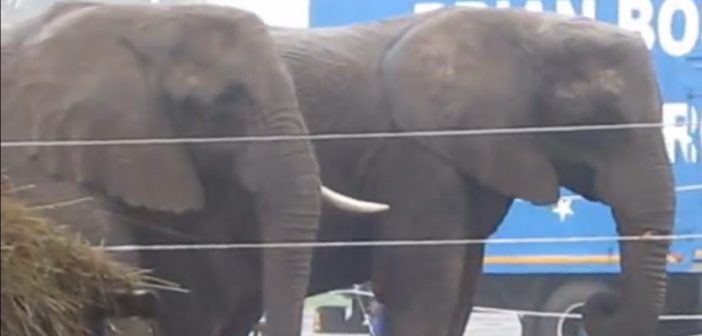(Featured image: Brian Boswell Circus elephants. Screenshot from video by Kim Trent, YouTube. Fair use)
Circus owner, Brian Boswell, is challenging the legality of elephant protection laws after his attempt to sell African elephants to a zoo in the United Arab Emirates was blocked by wildlife authorities.
Boswell has refused to accept the denial of a permit application to send five circus trained elephants to a Dubai zoo at the selling price of R3 million each, by mounting a High Court challenge to the validity of the 2008 Elephant Norms and Standards (ENS), which he claims are “policy and cannot be enforced”.
The Department of Environmental Affairs and provincial wildlife authorities of KZN, who will oppose the motion in Pietermaritzburg’s High Court next year, say Boswell’s case is flawed since he has misinterpreted the law regarding listed threatened or protected species (TOPS) as well as national biodiversity law (NEMBA) which states that the elephant legislation of the ENS is “binding and enforceable”.
Ezemvelo KwazuluNatal Wildlife (EKZNW) rejected his application in terms of South Africa’s biodiversity laws which do not allow elephants to be exported or imported into permanent captivity.
The restrictive ENS clauses preventing the sale state that no wild or captive elephant may be imported or exported from the Republic, and circus elephants may only be temporarily exported or imported for the duration of a performance time.
“As the ENS are officially Gazetted norms and standards they are certainly not mere policy guidelines, but binding law,” confirms attorney at the Centre for Environmental Rights, Aadila Agjee.
The much needed ENS came about due to the growing captive elephant industry; massive opposition to elephant culling as well as the infamous Tuli elephant torture case in 1999. The laws were developed with input from elephant scientists, and ensure there is now a uniform approach to managing elephants across the country.
“South Africa should be applauded for taking a stand through its ENS in trying to protect our elephants. It needs to be enforced as it takes into account the sentient nature and sensitive social structure of elephants as well as the devastating effects that capture, kidnapping, captivity and transportation has on them,” says Michele Pickover of the EMS Foundation Elephant Project.
“It is well known that circuses and private zoos take advantage of loopholes in national and international legislation to trade in live animals for their own financial gain.”
Boswell argues the ENS requirements make it too difficult to keep retired elephants. He also claims there is nowhere else for the retired 30 year old circus elephants to go since rehabilitation into the wild is not viable for highly trained, human imprinted elephants, and the only alternative would be to kill them.
However, ex-elephant trainer Brett Mitchell disagrees. Mitchell now focuses on reintegrating captive elephants into the wild and has successfully re-wilded over 25 captive elephants since 2014.
“A captive trained elephant can be successfully reintegrated into a wild or extensive system using a soft release method,” says Mitchell in a court statement.
Boswell says his rights to trade have been ignored and the delay in receiving his permits has caused him loss of income since Zimbabwe’s bourgeoning elephant trade is bringing down the price.
“I would be lucky now to get R1.5 million for each elephant,” he says, claiming he is within his rights to sue for financial loss.
But DEA deputy director for TOPS implementation, Magdel Boshoff, who pointed out that Boswell remains unregistered for keeping and trading elephants, accuses Boswell of appearing “more concerned about money than the inherent protection of the elephants that have served him in the past”.
Global opposition to keeping circus and zoo elephants is growing due to the negative welfare issues they endure in captivity. Welfare experts and scientists have highlighted that commonly used elephant training methods are cruel; captivity disrupts family bonds essential for their physical and emotional well-being and low breeding and high birth mortality rates confirm that no conservation value can be attributed to keeping captive elephants.
In 2013 protesters approached parliament to have the Animal Protection Act amended to ban the use of animals in circuses after footage depicting handlers abusing Brian Boswell Circus elephants was aired on national television.
__
Original article published by Conservation Action Trust at: http://www.sabreakingnews.co.za/2016/12/09/brian-boswell-circus-fights-laws-that-protect-elephants/





